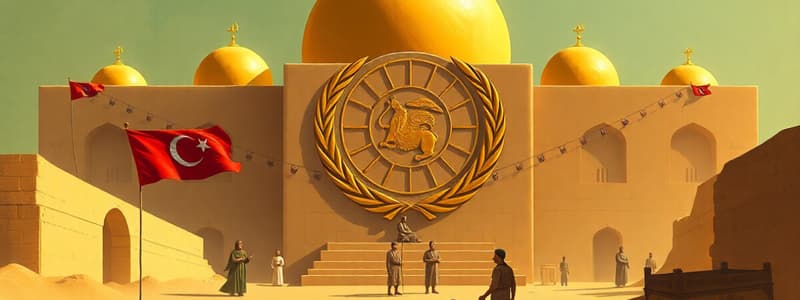Podcast
Questions and Answers
Who made the decision to cancel the Greater Syria project from Jordan?
Who made the decision to cancel the Greater Syria project from Jordan?
- The European Union
- The United Nations
- The Arab League (correct)
- The Government of Jordan
In what year was the decision to cancel the Greater Syria project made?
In what year was the decision to cancel the Greater Syria project made?
- 1948
- 1945
- 1946 (correct)
- 1952
Why did some Arab countries oppose the unity proposed by the Greater Syria project?
Why did some Arab countries oppose the unity proposed by the Greater Syria project?
- They were against military cooperation
- It threatened their political independence (correct)
- They preferred European alliances
- It was economically unfeasible
What freedoms were guaranteed by the 1952 constitution?
What freedoms were guaranteed by the 1952 constitution?
What was the primary reason behind the cancellation of the Greater Syria project?
What was the primary reason behind the cancellation of the Greater Syria project?
What is guaranteed in relation to expressing opinions?
What is guaranteed in relation to expressing opinions?
Which of the following is NOT a part of individual freedoms mentioned?
Which of the following is NOT a part of individual freedoms mentioned?
What event took place in 1929 that is relevant to freedom and rights?
What event took place in 1929 that is relevant to freedom and rights?
How can freedom of expression be defined in this context?
How can freedom of expression be defined in this context?
Which of the following rights is emphasized as a fundamental freedom?
Which of the following rights is emphasized as a fundamental freedom?
Flashcards
Who rejected the 'Greater Syria' project, and why?
Who rejected the 'Greater Syria' project, and why?
The League of Arab States rejected the project of a 'Greater Syria' consisting of Jordan, Syria, Lebanon, and Palestine, proposed by Jordan in 1946. This rejection was due to some Arab states fearing that the union would pose a threat to their own interests and security.
What rights did the 1952 Egyptian Constitution guarantee?
What rights did the 1952 Egyptian Constitution guarantee?
The 1952 Egyptian Constitution aimed to establish a democratic republic with key features like a multi-party system and separation of powers, guaranteeing fundamental freedoms, which were important for promoting individual rights and liberties.
Freedom of Religion
Freedom of Religion
Freedom to practice one's religion and beliefs without interference.
Freedom of Speech
Freedom of Speech
Signup and view all the flashcards
Freedom of the Press
Freedom of the Press
Signup and view all the flashcards
Freedom of Assembly
Freedom of Assembly
Signup and view all the flashcards
Freedom of Association
Freedom of Association
Signup and view all the flashcards
Study Notes
Arab League (1946)
- The Arab League was formed in 1946
- Some Arab states saw a unified Arab state as a threat
1952 Constitution
- The 1952 constitution guaranteed freedoms
- Freedom of religion and belief
- Freedom of expression (speech and writing)
- Freedom of press and printing
1929
- The 1929 meeting's results are not specified in the provided text.
Studying That Suits You
Use AI to generate personalized quizzes and flashcards to suit your learning preferences.
Related Documents
Description
This quiz explores the formation of the Arab League in 1946 and the key aspects of the 1952 Constitution, particularly focusing on the freedoms it guarantees. Test your knowledge of the historical context and implications for Arab states during this period.




